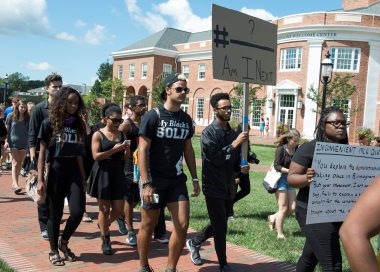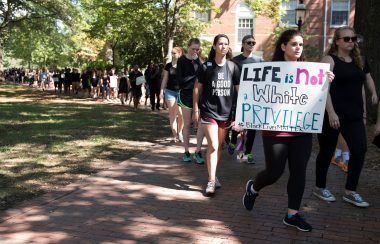A gathering and march was organized by Elon's Black Student Union in response to the shooting deaths of two men in Tulsa and Charlotte during the past week.
Spurred by the deaths of two black men fatally shot by police in Tulsa, Okla., and Charlotte, N.C., hundreds of students, faculty and staff marched silently through the Elon University campus on Sept. 23.
They held signs that called for an end to the violence and respect for black lives, with some signs raising the question, “Am I Next?” The three- and four-wide line of marchers extended for blocks, at one point stretching from the Moseley Center to McEwen building and stopping traffic along East Haggard Avenue.
“We’ve been outraged. We’ve been afraid. We’ve been sad and frustrated,” said Kaelyn Green ’18, a driving force behind the gathering and march organized by the Black Student Union. “Today our silence was loud, and our black was solid and our unity was strong.”
The march follows the shooting death on Tuesday of Keith Scott in Charlotte, a black man killed by police in a case that has sparked several nights of sometimes violent protests in North Carolina’s largest city. Friday’s event comes a week after a Tulsa police officer shot and killed Terrance Crutcher, an unarmed black man.
Alexis Williams ’18, president of the Black Student Union, said Green raised the idea of the gathering and march as a way to address the frustration that many are feeling on campus after these two deaths, the latest in a string of highly publicized police-involved shootings around the country.

Marchers, some of which were members of the larger Elon community, filled McKinnon Hall at the Moseley Center at the start of the event, which began with a viewing of video from a police helicopter of Crutcher as he walked down a Tulsa road with his hands up, with one officer referring to Crutcher as a “bad dude.” The video included a clip of Crutcher’s sister, Tiffany Crutcher, saying “that ‘big, bad dude’ was a father” as she fought back tears.
“We march today to let people know that we are not an enemy to be vanquished, but a people to be treasured,” Williams said before leading the marchers from McKinnon Hall out through Elon’s campus.
At the march’s end in front of Moseley Center, Elon Provost Steven House said as a community, it is better to come together during times of pain to support each other and have a dialogue about the pain and suffering.

Friday’s gathering and march is the first in a number of events at Elon to help address the issues surrounding recent police shootings.
On Monday, the Council on Civic Engagement is sponsoring “Columbus, Tulsa and Charlotte: What’s Next?,” a panel discussion about recent events moderated by Professor Buffie Longmire-Avital. The discussion will be from 5 to 6:15 p.m. in the McBride Gathering Space in Numen Lumen Pavilion.
On Oct. 3, the Black Student Union joins the Elon African Society, the Latin American Student Organization, the Asian-Pacific Student Organization and Spectrum for “You’ve Got a Friend in Me: How to be an effective ally.” The discussion is designed to give the student body tools to discuss the issues facing minorities and other marginalized groups on campus, Williams said. The event will be from 7 to 8:15 p.m. in Lakeside 214.


